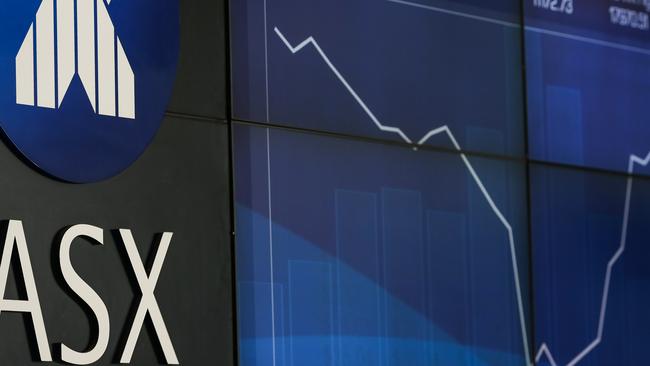ASX drops $41bn in biggest fall in four months
Investors wiped $41bn off the Australian sharemarket as the bull market in the US started to show signs of fatigue.

Investors wiped $41bn off the Australian sharemarket as the bull market in the US started to show signs of fatigue.
In its biggest fall in four months, the benchmark S&P/ASX 200 index closed down 131 points, or 1.9 per cent, at 6649.7 points after falling as much as 2.7 per cent to a three-week low of 6597.6.
After hitting an 11-month high of 6824.7 on Monday, the bourse was hit by profit taking on high-flying iron ore miners and other resources stocks after Australia Day. Then on Wednesday the global flagship S&P 500 index dived 2.6 per cent, its biggest fall since October 28, amid earnings disappointment, push back on fiscal stimulus plans and the slow rollout of COVID vaccines.
The US share market saw the highest amount of trading value in history on Wednesday.
The US share market selloff is believed to have been magnified by asset liquidation by hedge funds that were forced to stop-losses by closing their short positions in GameStop and AMC Entertainment as they surged massively amid Reddit-driven retail buying that led the Securities Exchange Commission warn that it’s “actively monitoring the ongoing market volatility” – a potential precursor to regulatory action that may include raising the initial margin requirements for trading.
GameStop rose 135 per cent and AMC Entertainment rose 301 per cent in a day, capping highly speculative moves that have squeezed short positions held by institutional investors.
Earlier in the week Bloomberg reported that a large US hedge fund Melvin Capital was forced to seek a financial rescue from two other funds after losing about 30 per cent of its capital this year – including on short bets on GameStop. Citadel and Point72 Asset Management injected a combined $2.75bn into Melvin return for a share in future revenues.
“While recent COVID -19 news and snail-paced vaccine rollouts have been horrifyingly discouraging, but the big picture does not change in terms of markets outlook,” said Stephen Innes, chief global markets strategist at Axi.
“Namely, an unprecedented amount of monetary and fiscal stimulus, a structural shift towards much more spending, a potentially unmatched economic rebound and a reasonable chance of inflation for the first time in several decades.”
In afterhours trading on Thursday, S&P 500 futures fell as much as 1.1 per cent after shares of Apple, Tesla and Facebook dived after their earnings reports disappointed the market, but a subsequent bounce in US futures allowed the Australian market to recover somewhat.
Technology was the biggest drag with Afterpay, Xero and WiseTech down more than 6 per cent.
Other underperforming sectors included Health Care, Materials and Energy.
In those sectors, CSL fell 3 per cent, Fortescue Metals lost 4 per cent and Oil Search fell 3.9 per cent.
Much of the intraday bounce came from a rebound in banks, with CBA ending down 1.7 per cent and NAB down 1.2 per cent after initially falling more than 3 per cent.
A global quantitative fund is understood to have been actively buying shorted Australian stocks.
“They were apparently buying baskets of stocks with the highest ratio of shorts with the highest ratio of shorts to their daily trading volume,” said Bell Potter’s head of institutional sales and trading, Richard Coppleson.
“This is a phenomena that could easily take off here and some of our big shorts could also get a big shock if more of these Quant funds come in and put pressure on them.”
European malls owner Unibail-Rodamco-Westfield rose 15 per cent after its European-listed shares surged 20 per cent as French officials said there was no need to decide on a new national lockdown.








To join the conversation, please log in. Don't have an account? Register
Join the conversation, you are commenting as Logout